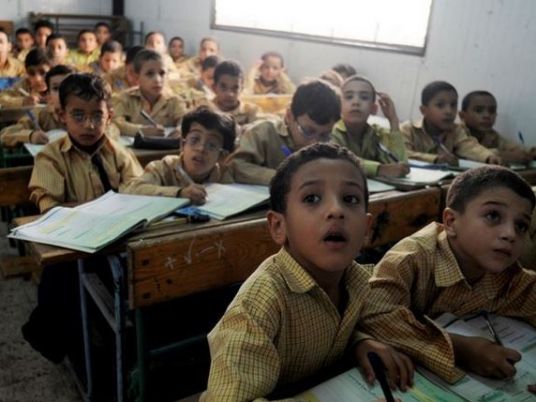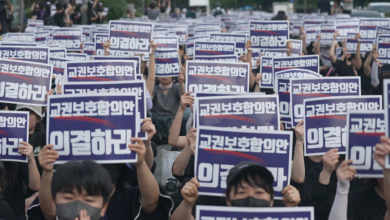
The Egyptian Foundation for Advancement of the Childhood Condition (EFACC) revealed in its monthly report that March 2017 saw the highest rates of child abuse in Egypt over the last five years. In March alone, at least 1,121 children were subjected to several forms abuse including murder, kidnapping, rape, drowning and other cases.
The figures showed that 13 percent of the cases involved girls and 16 percent involved boys; the gender in 71 percent of the cases was not specified. The report showed it was children from ages 1 to 5 who were abused the most.
According to the report, March's violations against children included nine cases of kidnapping, 35 cases of sexual exploitation, 966 cases of children injured in accidents, 801 cases of poisoning and 64 cases of road accidents.
“Egypt is one of the countries with the highest rates of road accidents, according to reports issued by the World Health Organization (WHO),” the report said. According to WHO, Egypt loses about 12,000 lives due to road traffic collisions every year. It has a road traffic fatality rate of 42 deaths per 100,000 people.
As for the 966 cases of injury in March, the report said children were injured due to child labor and violence at school, in the home and at orphanages.
Last month, the Ministry of Social Solidarity decided to fire the head of Ishraqa orphanage and move the orphanage’s administration and supervision to Dar al-Orman charity. The head of the orphanage was accused of torturing 16 children living at the facility.
The report also mentioned seven cases of suicide. Hatem Zaher, a psychiatrist and the head of Nour Zyada for Child Psychiatry, believes that the national figures are not a good representation of the number of children who kill themselves in Egypt. He suggests that over 100 children commit suicide annually, but they are recorded as accidental deaths instead.
From Zaher’s point of view, the key reasons behind child suicide are the family and the media. “Parents are every child's role model, therefore many children believe that everything done by their parents is 'ideal'. For instance, I remember a child who sliced his arteries after a fight with his friend, because he had watched his dad (who had psychological disorders) self-harming whenever he got angry,” Zaher said.
Amal Gouda, member of the Egyptian Coalition for Children’s Rights, said she was shocked by the increasing number of children who commit suicide according to several children's rights reports. "We are breaking the record for the number of child suicide cases, which I believe is due to several factors, including poor financial status, family conflict, violence in orphanages or at school and violent cartoons," she said.
The foundation also cited 18 cases of drowning, a case of medical malpractice and another case of early marriage.
The report went on to say that 74 children were killed, and detailed the reasons; two were shot dead, four cases were due to child labor, four cases of domestic violence, 32 cases of road accidents, 10 cases of other accidents, one case of a building collapse, 15 cases of fire, two cases received an electrical shock and two poisoning cases.
The report said the increasing number of accidents involving children in March, as compared to the previous months, is due to the wave of food poisoning that swept Egypt's schools across various governorates — as of yet there is no governmental explanation for the crisis.
Recently several schools nationwide saw dozens of poisoning cases. Monufiya recorded 81 students as having been poisoned, while in Sohag the number jumped to 800 students across eight schools in two villages, while Daqahlia city saw 33 primary school pupils poisoned after eating popcorn at their government-run school.
“We did not receive a single official statement about punishing the culprits and all the Ministry of Education did was cancel school meals, which is considered a condemnation against the ministry itself,” the report said.
The report also shed light on the increase of sexual abuse cases in March; 35 cases were recorded, one in which the molester was a relative, 24 cases involving street children, two sexual exploitation cases involving children who were begging and eight other sexual harassment cases.
"Anyone who harasses children is doubtlessly suffering a psychological disorder; he might be antisocial or psychopathic because he lacks emotion and feeling during his attempt to harass the child,” Gamal Farweiz, a psychiatrist, told Egypt Independent.
Farweiz pointed out that most of the children who have been molested were assaulted by their relatives.
Sara Aziz, a certified counselor for children who are victims of molestation, corroborated this information when speaking to Al-Kahera Wel Nas television channel, saying that those who abuse children are often people they already play with, know and have a concrete friendship with. "He could be the uncle, the father, the grandfather, the neighbor, the brother, the house guard, the sports trainer or the teacher,” Aziz said.
The report pointed out that the rural provinces hold the lion's share of child abuse cases, reaching 145 cases compared to urban areas which saw 37 cases of violations against children.
The report builds its statistics based on content analysis method from media sources, especially the government, non-governmental newspapers and online news outlets.
The foundation stressed the need to activate the general protection committees in the provinces to draw up general policies for child protection so as to reduce the number of children who are injured in road accidents and to address other issues of abuse such as kidnapping and begging. All concerted ministries should exert efforts to provide effective solutions to address child abuse issues.
“Actually the real numbers are much higher than these [in the report], but most children's right foundations build their statistics on news and what is mentioned in the media," Gouda said.
Gouda believed that the high number of violations against children are due to several reasons. She cited the major reason as the "violence" in our cultures, explaining that even according to our popular proverbs many families believe that if you beat your child he or she will be better behaved. Violence is insidious and could be found anywhere children frequent.
"Moreover, the governmental monitoring bodies have fallen short in their roles, including the National Center for Childhood and Motherhood, watchdogs and orphanages. The number of violations against children in these places has increased and from time to time we hear about new cases of abuse that were discovered by coincidence," she said.
Gouda pointed out that the Child Law has not been activated efficiently, especially in the articles that tackle launching protection committees and putting restrictions on child labor. “Child labor is a very complicated issue as the employer exploits the child's poor economic status and his or her youth and health. Even with no health insurance, he assigns the child to work in very dangerous work places including quarries and marble factories that could either ruin the child's health or kill him," Gouda said.



